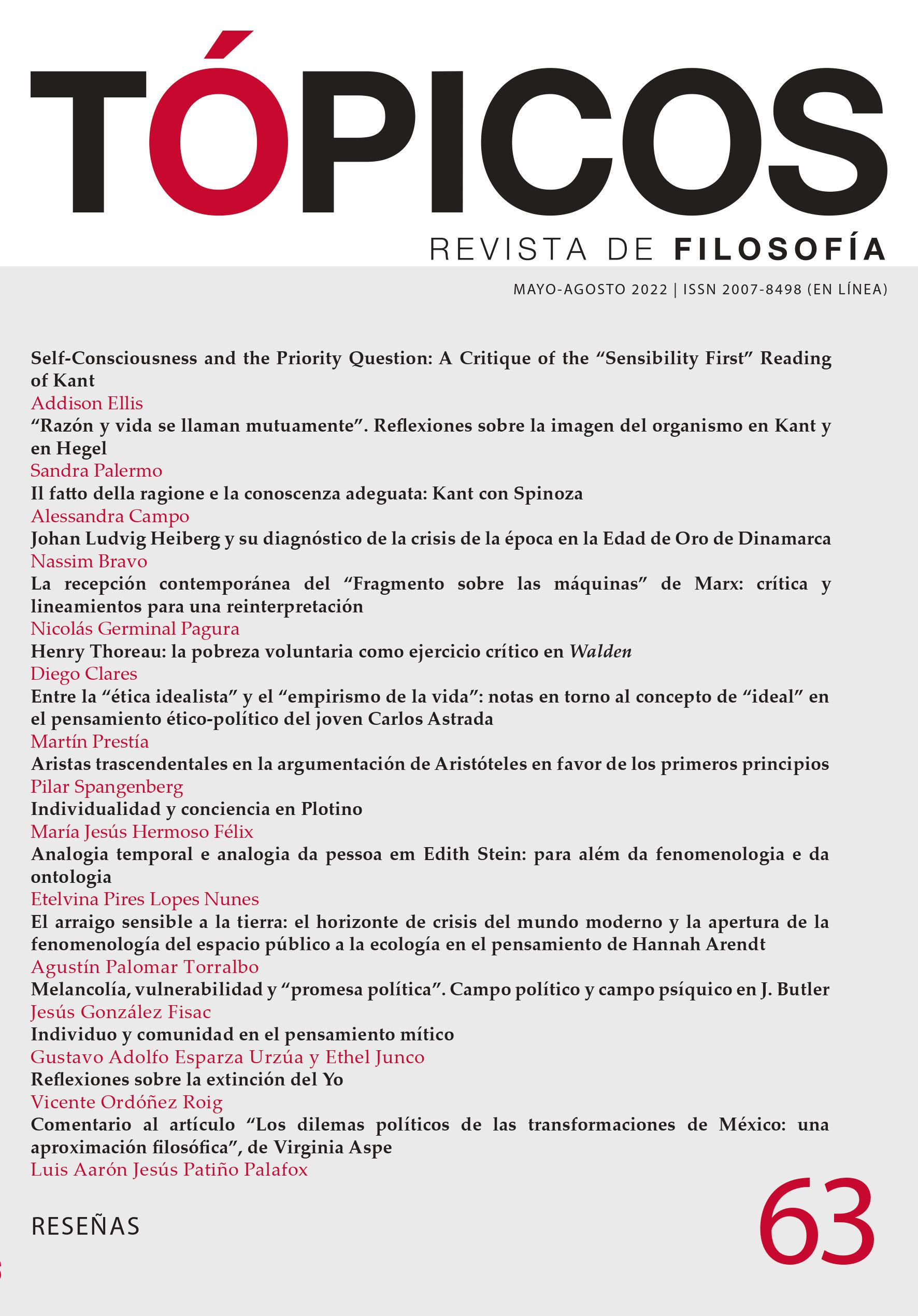Self-Consciousness and the Priority Question: A Critique of the “Sensibility First” Reading of Kant
Publiée 2022-04-18
Mots-clés
- Kant,
- self-consciousness,
- sensibility,
- non-conceptualism
(c) Copyright Tópicos, Revista de Filosofía 2022

Ce travail est disponible sous licence Creative Commons Attribution - Pas d'Utilisation Commerciale - Pas de Modification 4.0 International.
Comment citer
Résumé
This essay presents a critique of what Robert Hanna has recently called the “sensibility first” reading of Kant. I first spell out, in agreement with Hanna, why the contemporary debate among Kant scholars over conceptualism and non-conceptualism must be understood only from within the perspective of what I dub the “priority question”—that is, the question whether one or the other of our “two stems” of cognition may ground the objectivity and normativity of the other. I then spell out why the priority question may be asked only from within the perspective of self- consciousness. Specifically, the central issue to be dealt with is how what Kant calls the original combination of understanding and sensibility is a synthesis internal to an act of self-consciousness. Only then can we ask what that original synthesis might tell us about the possibility of prioritizing one capacity over another in a story of cognition generally. Once we see the central issue more clearly, then I will look at the “sensibility first” view in its most general form and propose that it should be criticized for its failure to account for Kant’s notion of an objective unity of self-consciousness.
Références
- Allais, L. (2015). Manifest Reality: Kant’s Idealism and His Realism. Oxford University Press.
- Boyle, M. (2016). Additive Theories of Rationality: A Critique. European Journal of Philosophy, 24(3), 527-555.
- Boyle, M. (2019). Transparency and Reflection. Canadian Journal of Philosophy, 49(7), 1012-1039.
- Byrne, A. (2018). Transparency and Self-Knowledge. Oxford University Press.
- Conant, J. (2017). Kant’s Critique of the Layer-Cake Conception of Human Mindedness in the B Deduction. In J. R. O’Shea (ed.), Kant’s Critique of Pure Reason: A Critical Guide. (pp. 120-139). Cambridge University Press.
- Engstrom, S. (2013). Unity of Apperception. Studi Kantiani, 26, 37-54.
- Golob, S. (2016). Why the Transcendental Deduction is Compatible with Nonconceptualism. In D. Schulting (ed.), Kantian Nonconceptualism. (pp. 27-52). Palgrave Macmillan.
- Hanna, R. (2001). Kant and the Foundations of Analytic Philosophy. Oxford University Press.
- Hanna, R. (2005). Kant and Nonconceptual Content. European Journal of Philosophy, 13(2), 247-290.
- Hanna, R. (2015). Cognition, Content, and the A Priori: A Study in the Philosophy of Mind and Knowledge. Oxford University Press.
- Hanna, R. (2019). Kant’s B Deduction, Cognitive Organicism, the Limits of Natural Science, and the Autonomy of Consciousness. Contemporary Studies in Kantian Philosophy, 4, 29-46.
- Hegel, G. W. F. (2010). The Science of Logic. G. di Giovanni (trans.). Cambridge University Press.
- Heidegger, M. (1962). Kant and the Problem of Metaphysics. J. Churchill (trans.). Indiana University Press.
- Kant, I. (1992). Lectures on Logic. J. Michael Young (trans). Cambridge University Press.
- Kant, I. (1998). Critique of Pure Reason. P. Guyer and A. Wood (trans). Cambridge University Press.
- Kant, I. (2018). Religion within the Boundaries of Mere Reason. And Other Writings. A. Wood and G. Di Giovanni (trans.). Cambridge University Press.
- Kern, A. (2015). Does Knowledge Rest Upon a Form of Life? International Journal for the Study of Skepticism, 5, 13-28.
- Land, T. (2016). Moderate Conceptualism and Spatial Representation. In D. Schulting (ed.), Kantian Nonconceptualism. (pp. 145-170). Palgrave Macmillan.
- Longuenesse, B. (1998). Kant and the Capacity to Judge. Princeton University Press.
- McDowell, J. (1994). Mind and World. Harvard University Press.
- McDowell, J. (2009). Having the World in View: Essays on Kant, Hegel, and Sellars. Harvard University Press.
- McLear, C. (2015). Two Kinds of Unity in the Critique of Pure Reason. Journal of the History of Philosophy, 53(1), 79-110.
- Moran, R. (2001). Authority and Estrangement: An Essay on Self-Knowledge. Princeton University Press.
- Newton, A. (2015). Kant on the Logical Origin of Concepts. European Journal of Philosophy, 23(3), 456-484.
- Newton, A. (2016). Non-Conceptualism and Knowledge in Lucy Allais’s Manifest Reality. Kantian Review, 21(2), 273-282.
- Newton, A. (2018). Review of Schulting’s Kantian Nonconceptualism. Kantian Review, 23(2), 329-332.
- Newton, A. (2019). Kant and the Transparency of the Mind. Canadian Journal of Philosophy, 49(7), 890-915.
- Onof, C. and Schulting, D. (2015). Space as Form of Intuition and as Formal Intuition: On the Note to B160 in Kant’s Critique of Pure Reason. Philosophical Review, 124, 1.
- Schulting, D. (2012). Kant, Non-Conceptual Content, and the “Second Step” of the B-Deduction. Kant Studies Online, 51-92.
- Schulting, D. (2016). Kantian Non-Conceptualism. Palgrave Macmillan.
- Tolley, C. (2013). The Non-Conceptuality of the Content of Intuitions: A New Approach. Kantian Review, 18(1), 107-136.
- Waxman, W. (2014). Kant’s Anatomy of the Intelligent Mind. Oxford University Press.
- Weatherston, M. (2002). Heidegger’s Interpretation of Kant: Categories, Imagination, and Temporality. Palgrave Macmillan.
- Williams, J. (2017). Kant on the Original Synthesis of Understanding and Sensibility. British Journal for the History of Philosophy, 26(1), 66-86.





